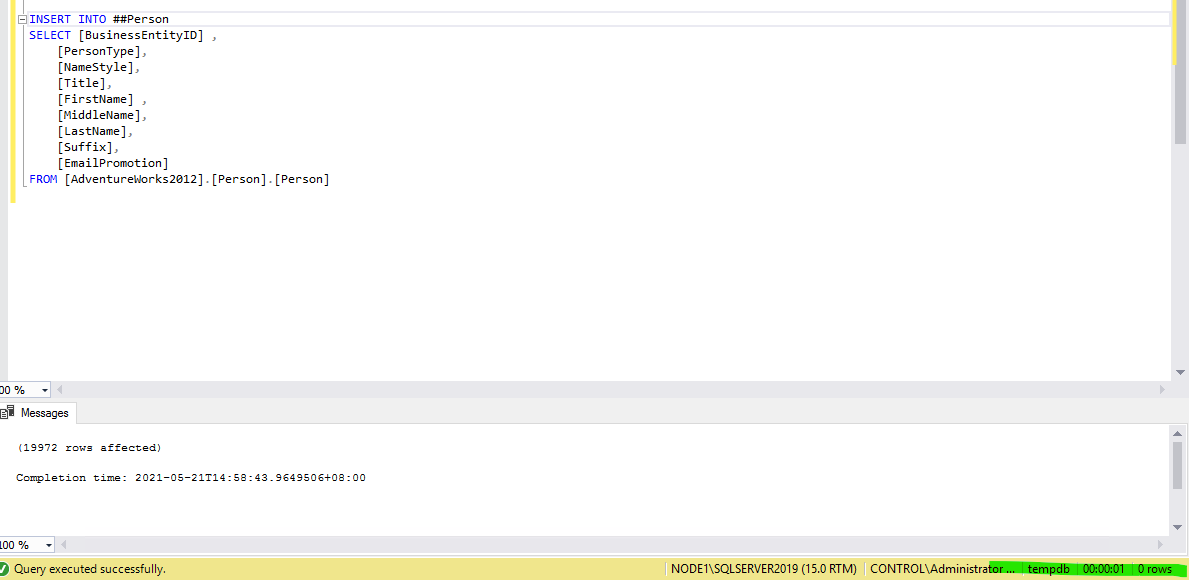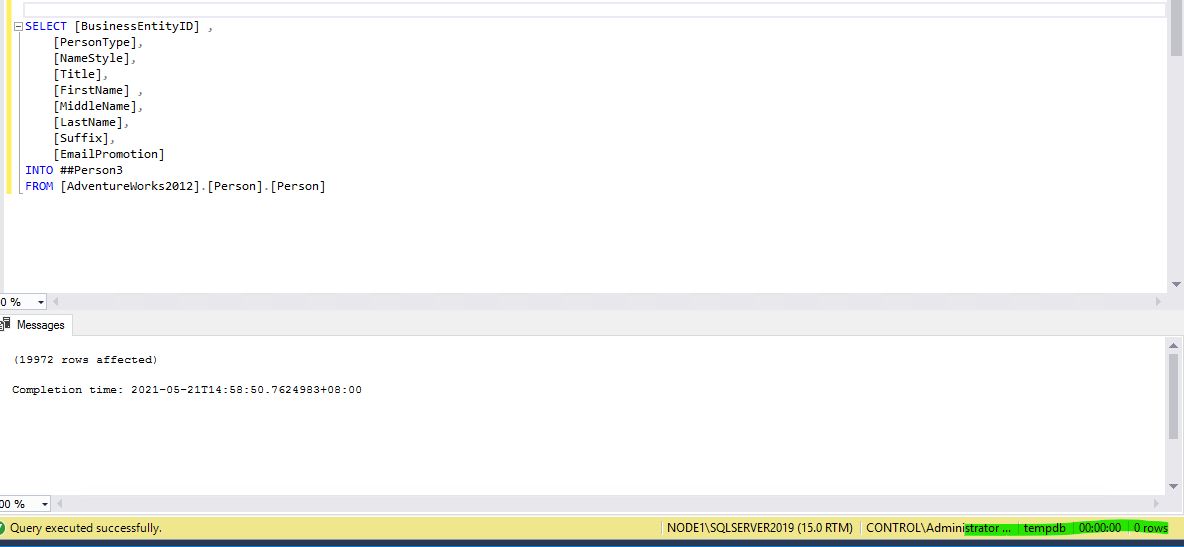I don't think that counts as a global temp table. I'm already past my bedtime, so I don't have the time to test. But since you have the table in a schema, I would think that the database is in the same database as the source table. Which I guess is fully logged, so quite some time may be spend on growing log and data files.
Inserting data to Global Temporary table taking longer time
Hi, I have a very large table - Table1
I am trying to have a temporary Global table , which contains the subset of the large table. But the insertion of data from Table1 to Global table is taking a longer time. I do not have access to run the sql execution plan / create index. The Table1 does not contain a IDENTITY column, but has another column as Primary key.
Below is the code which I am trying:
create table session.##change_criteria(CHANGE_DATE_FROM DATE not null, CHANGE_DATE_TO DATE not null)
insert into session.##change_criteria values ('2020-09-21','2020-09-28')
create TABLE session.##new_changes ( Test_ID integer not null, TestName char(15) not null )
insert into session.##new_changes select Test_ID, TestName from TABLE1 with (nolock)
where CAST(CREATION as date) >= (select CHANGE_DATE_FROM from session.##change_criteria) and
CAST(CREATION as date) <= (select CHANGE_DATE_TO from session.##change_criteria) or
CAST(RECONDT as date) >= (select CHANGE_DATE_FROM from session.##change_criteria) and
CAST(RECONDT as date) <= (select CHANGE_DATE_TO from session.##change_criteria)
The last insert is causing performance issues, to insert a weeks data alone , it is taking more than 2.5 hours. The first 3 statements do not take any time, only the last insert is having the issues.
How to fix this?
SQL Server | Other
4 answers
Sort by: Most helpful
-
 Erland Sommarskog 121.8K Reputation points MVP Volunteer Moderator
Erland Sommarskog 121.8K Reputation points MVP Volunteer Moderator2021-05-20T22:18:15.46+00:00 -
 CarrinWu-MSFT 6,891 Reputation points
CarrinWu-MSFT 6,891 Reputation points2021-05-21T07:13:08.883+00:00 Welcome to Microsoft Q&A!
According to this blog, we could know SELECT...INTO was considerably faster than INSERT…INTO.
And I also made a test as below, we could see SELECT…INTO is faster:


Best regards,
Carrin
If the answer is helpful, please click "Accept Answer" and upvote it.
Note: Please follow the steps in our documentation to enable e-mail notifications if you want to receive the related email notification for this thread. -
 Viorel 122.6K Reputation points
Viorel 122.6K Reputation points2021-05-21T08:01:25.63+00:00 If CREATION and RECONDT are datetime, then consider this approach too:
declare @change_date_from as datetime, @change_date_to as datetime select @change_date_from = CHANGE_DATE_FROM, @change_date_to = dateadd(day, 1, CHANGE_DATE_TO) from session.##change_criteriaThen use the next WHERE condition:
. . . WHERE ( CREATION >= @change_date_from and CREATION < @change_date_to ) or ( RECONDT >= @change_date_from and RECONDT < @change_date_to )Show details about these columns and maybe check if indices are required.
-
 Erland Sommarskog 121.8K Reputation points MVP Volunteer Moderator
Erland Sommarskog 121.8K Reputation points MVP Volunteer Moderator2021-05-21T21:40:20.84+00:00 I do not have access to run the sql execution plan
Then you may have to ask some to get the execution plan for you. For most of situations when you have a slow query, it is essential to get the execution plan. Else you are only fumbling around in darkness.
Then again, this is a fairly simple query, and unless those dates select a small portion of the table, a table scan is the only reasonable option. So it can be worth looking at other bottlenecks.
Open a new query window and run the script. When it has completed run this query:
SELECT * FROM sys.dm_exec_session_wait_stats WHERE session_id = @@spid ORDER BY wait_time_ms DESCWhat are your top waits?
Note: this query will not run on SQL 2014 or earlier.
Also, please share the output of "SELECT @@version".